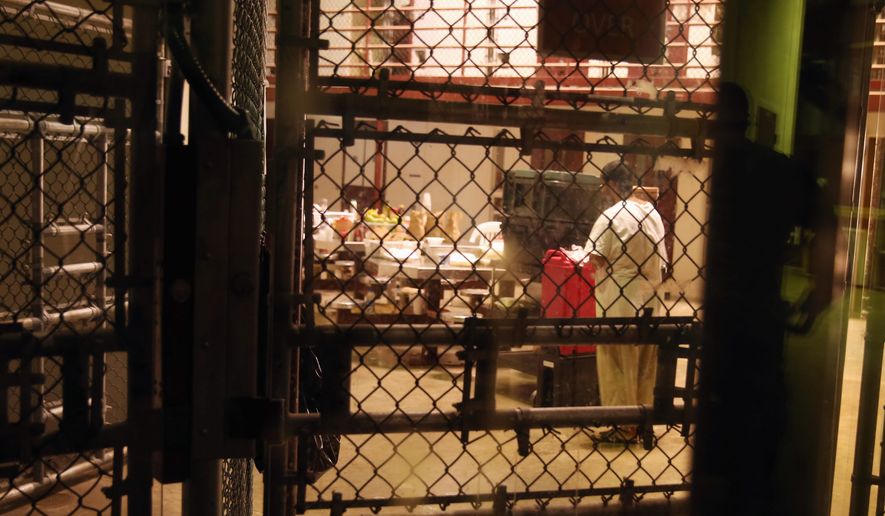President Trump’s executive order paving the way to send more terrorism suspects to Guantanamo Bay in Cuba is reversing more than a decade of U.S. policy aimed at winding down operations at the notorious prison.
The “Gitmo” facility hasn’t accepted a new detainee since June 2008 during the Bush administration, when Muhammad Rahim al-Afghani was sent there. Considered a “high-value” detainee, the citizen of Afghanistan is approaching his 10th year in captivity without being charged.
Over 16 years of operation, Gitmo has held about 780 detainees. The U.S. is still holding 41 suspects there, down from a peak prison population of 684 in June 2003.
Beginning in late 2003, Presidents George W. Bush and Barack Obama actively worked to transfer detainees out of the prison to countries willing to accept them, with both presidents believing Guantanamo had become a motivational recruiting symbol for jihadi groups. Mr. Bush eventually released a total of 532 detainees; and Mr. Obama, who fought Congress for eight years to close the prison, transferred 197.
Now, Mr. Trump’s executive order will keep the facility open and will give Defense Secretary James N. Mattis 90 days to recommend guidelines to the president for transferring to Gitmo on a case-by-case basis those terrorists whom U.S. forces capture overseas.
Mr. Trump’s move is consistent with his campaign pledge to keep open Gitmo and send more “bad dudes” there to protect U.S. national security.
Although Mr. Trump has yet to send any captured Islamist fighters to Gitmo, the U.S.-led fight against the Islamic State in Iraq and Syria could provide some fresh candidates. U.S. and allied commanders are working with regional counterparts to draft a plan on what to do with the hundreds of terrorists taken into custody in Iraq and Syria.
“We have engaged in a concerted effort to contact [detainees’] countries of origin, to determine whether they are willing to take them back,” Air Force Gen. Paul J. Selva, vice chairman of the Joint Chiefs of Staff, told reporters in Washington this week.
In the fight against the Islamic State and al-Qaeda, Mr. Trump said in his State of the Union address Tuesday, Congress must authorize “all necessary power to detain terrorists — wherever we chase them down, wherever we find them.”
“For many cases, for them, it will now be Guantanamo Bay,” he said. “They are unlawful enemy combatants, and when captured overseas, they should be treated like the terrorists they are.”
The president also referred to a government report last year showing that more than 120 former detainees re-engaged in terrorism after their release from Gitmo.
“In the past, we have foolishly released hundreds of dangerous terrorists, only to meet them again on the battlefield,” Mr. Trump said, going on to refer specifically to Islamic State founder Abu Bakr al-Baghdadi, who was detained by American-led forces during the U.S. military occupation of Iraq in 2004 but was later released from custody.
Democrats are criticizing Mr. Trump’s move, saying it violates U.S. law and costs too much money.
“With a cost that has now topped $5 billion, keeping Guantanamo open is a drain on taxpayers and a recruiting tool for terrorists,” said Sen. Dianne Feinstein, California Democrat. “Most importantly, holding prisoners without charge or trial for decades erodes the bedrock of our democracy. It’s a clear violation of due process and the rule of law.”
Rep. Adam Smith of Washington, ranking Democrat on the House Armed Services Committee, said Mr. Trump’s actions “are taking us in the wrong direction.”
“I have long fought for a responsible closure of the facility and I will continue to do so until that goal is accomplished,” Mr. Smith said.
But Todd M. Rosenblum, a former Pentagon and Homeland Security official in the Obama administration said Mr. Trump’s pledge to keep the prison open “is not a new position for the U.S. government.”
“The detention center already was going to stay open for many years, as President Obama came to conclude one year after he assumed office,” Mr. Rosenblum wrote in the Cipher Brief. “The unresolvable conundrum is our inability to move many key detainees into the U.S. judicial system.”
He said the evidence gathered against the remaining hardened detainees “was acquired either during enhanced interrogations or without available witnesses.”
“Because of decisions made in the early and mid-2000s, these people are in legal limbo. We cannot try them and we cannot release them,” Mr. Rosenblum wrote. “There is no option but to hold them outside U.S. territory. The president’s statement acknowledges this reality.”
But the Center for Constitutional Rights, which filed a federal court brief this month seeking the release of 11 Gitmo detainees, said Mr. Trump’s executive order “is not the last word.”
“It is the courts, not the authoritarian-in-chief, that will ultimately determine the fate of the men detained at Guantanamo,” the group said.
Mr. Trump’s order said the prison operations at Guantanamo Bay are “legal, safe, humane, and conducted consistent with United States and international law.” The CCR’s brief disputes that, stating that more than 100 detainees have gone on hunger strikes over the years and at least nine have taken their own lives.
“Prisoners are medicated for depression and anxiety brought on by acute despair,” CCR’s brief stated. “Some detainees have starved themselves nearly to the point of death to protest against their open-ended imprisonment at Guantanamo.”
• Dave Boyer can be reached at dboyer@washingtontimes.com.




Please read our comment policy before commenting.